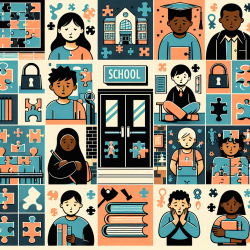Empowering Children: Bridging the Gap Between Food Insecurity and Self-Esteem
As practitioners in the field of speech-language pathology and online therapy, we are deeply invested in creating positive outcomes for children. A recent study titled Canadian Children from Food Insecure Households Experience Low Self-Esteem and Self-Efficacy for Healthy Lifestyle Choices highlights a crucial area of concern that demands our attention and action.
Understanding the Study
The study analyzed data from 5,281 fifth-grade students in Canada, revealing that children from food-insecure households are significantly more likely to experience low self-esteem and self-efficacy. These children struggle with making healthy lifestyle choices, and the effects are more pronounced in girls than boys. The research underscores the impact of household income as a critical determinant of these associations.
Implications for Practitioners
As practitioners, understanding these findings is crucial for tailoring interventions that address the root causes of low self-esteem and self-efficacy among children. Here are some actionable steps:
- Integrate Socioeconomic Context: When assessing a child's communication and learning challenges, consider the socioeconomic factors that may be influencing their mental health and self-efficacy.
- Collaborate with Schools: Work closely with educators to develop programs that bolster self-esteem and self-efficacy, particularly for children from food-insecure households.
- Advocate for Policy Change: Support policies that aim to improve household income and food security, recognizing their long-term impact on children's mental health and educational outcomes.
Encouraging Further Research
While this study provides valuable insights, further research is needed to explore the long-term effects of food insecurity on children's mental health and educational achievements. Practitioners are encouraged to engage in or support research initiatives that examine these dynamics across different demographics and regions.
Conclusion
Addressing food insecurity is not just about providing meals; it's about empowering children to believe in themselves and their abilities. By integrating these findings into our practice, we can help bridge the gap between food insecurity and self-esteem, fostering a brighter future for all children.
To read the original research paper, please follow this link: Canadian Children from Food Insecure Households Experience Low Self-Esteem and Self-Efficacy for Healthy Lifestyle Choices.










